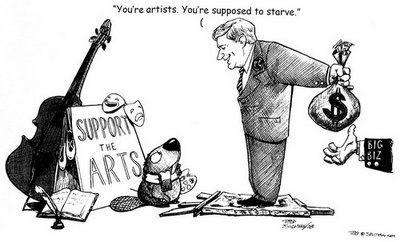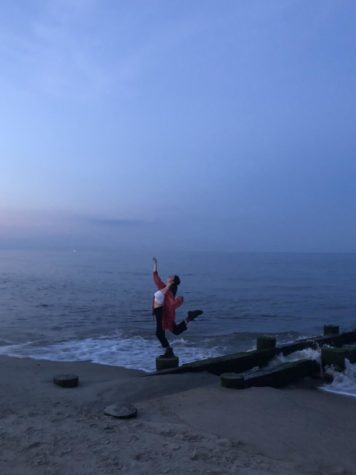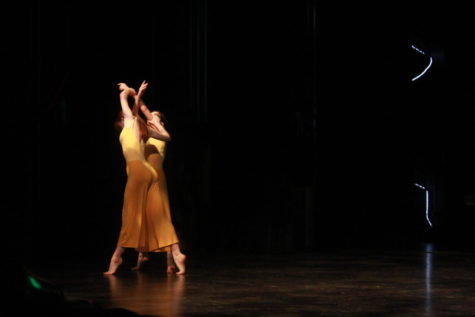The “Starving Artist” Dilemma

May 21, 2018
At Sandy Spring Friends School, we take pride in preparing students for college. Through AP classes, standardized testing, and rigorous academics, students often feel prepared to pursue academics at college and careers after graduating SSFS. But what happens if you decide to take an alternative route and pursue art? What happens when your college and career goals start to look very different in comparison to your peers but you’re still at a college preparatory school?
To answer these questions, I sat down with Wes Livezey, a senior at SSFS who will be attending Alfred University in the fall to study ceramics and conceptual sculpture. “I think that my projects in art classes are sometimes deemed less important, and some of my academic teachers don’t recognize that as a crucial way for me to spend my time,” he said. “It’s viewed as an extracurricular, and a ‘fun’ class, where in reality it’s just as much work, if not more.”
When asked if he has experienced any stigma or criticism surrounding his choice to pursue a less accepted career, Wes touched on the bittersweet reactions that he has received: “When I tell people what I want to do, there’s that element of ‘That’s so cool!’ and ‘You’re not gonna make any money.’ With art, I think that some people separate your major with what you plan to do in life, as if it cannot be the same. People often assume that I’m going to have to find another source of income, which I probably will, but to assume failure before I’ve really started my career isn’t the most encouraging thing.” This dilemma of financially stability has followed Wes since he was young. “When I was in 2nd grade, my teacher asked us what we wanted to be when we grow up, and when it was my turn, I said that I wanted to be an artist. My teacher laughed and said ‘That’s nice. You might want to find something that makes more money.’”
Perhaps this pressure to pursue an academic career to ensure financial success is the reason that some people are judgemental towards others pursuing their passion for art. The reality is: some people want to do what they truly love, an artform or a non-academic passion, and are simply too scared of failure.
As a dancer, I often feel disconnected from students around me when conversations surrounding college arise. I plan to major in dance; some of the art schools that I dream of attending do not require test scores, and some do not even offer science and math programs. Nevertheless, it is hard not to still feel the pressure of grades, test scores, and academic success. After receiving scores on the ACT and PSAT that I was not happy with, I continuously had to remind myself that these numbers are not scores of my worth, my knowledge, or my future success. My goals for the future look a lot different than others who might strive for a perfect SAT score. Wes keeps this in mind as well, and has learned to relieve this pressure: “I think that SSFS is interesting in that there are two ‘cultures’ within the school. There’s the faculty and students who are trying to pursue what they love, and this is a place that will nurture that. And there are the people who are trying to pursue success, wherever they can find that. The people who prioritize success over personal fulfillment put a lot of stress on test scores and standardized testing. But when you switch your mindset to prioritizing personal fulfillment, success starts to look different than a test score.”
No matter the stigma or the pressure that society puts on students, we as artists value our art more than anything. As Wes says, “Someone once told me that the only reason a person should pursue art, is if they can’t see themselves happily doing anything else. I can’t see myself being happy without creating art and sharing that with the world.” I couldn’t agree more. While the risk of financially instability remains frightening, I have found so much happiness and purpose in dance, that I cannot imagine dedicating my life to anything else. All in all, I strive to appreciate my access to education here at SSFS, while embracing my artistic goals, which may differ from those around me.







Scout Crooke • Jun 1, 2018 at 7:37 pm
This is is a really great article and I sincerely agree with the points made in it. After reading this article, my brain is streaming with so many different ideas. This article made me wonder about different broad questions in life such as, “what is the meaning of life?” or “what is your life goal?” And for may people the answer to this is “To be happy”. People are all different in some way, some more than others, but the point is that “to be happy” is achieved by people in many different ways. For some, doing well in school, and then being wealthy, and having access to “scarce resources”(quoted from the other comment) could make them happy because with that, they can “fulfill their dreams”. But for others, they might not need all these things and may simply be happy with doing what they love, like art, and perhaps still be “fulfilling their dreams”. Because in the long run, “how much does money really matter in you being happy? and how great is its effect on your happiness?” The answer to this question will also vary for different people. Some people will be extremely happy if they are rich and have all this money. But others might be just as happy with not as much money, as long as they are doing what they love to do in life. This article and the other comment also made be think about wealth and the value of owning stuff. For example, lets say a person is really rich and has a lot of property, and goods, etc. However, if that person does not really use these resources that they have, then does the person really “own” that stuff? because if you don’t use something, do you still really own it? the answer to this question could be that maybe you partially own it because maybe you have a contract that declared it or something, but do you really completely own it? because if you don’t even use it, then its almost like there is no use in owning it because its just sitting there not being used. This thought then made me think of minimalism and the people who value this, but that is a whole other story for another day. This then led me to think about people who own tiny houses because they realize they don’t need this huge house to be happy, because they can spend their time outside or wherever, doing what they love and want to do. Which leaves me to say; people can still get by in life and still be happy even if they do not have that much money, property, or that many goods, it all depends on life. And “life is like a roller coaster”, “Life is like a box of chocolates, you never know what you’re gonna get.” Who knows? maybe this artist will turn out to be supper successful, although it may not seem as likely to some people, it is still possible. And the fact that you are willing to take a “risk” in life and pursue art even if you might not get that much money is very commendable, because in the long run, it’s about what is going to make you happy.
(sorry my comment is so long).
Hanke Chen • May 24, 2018 at 9:34 pm
As a person who would be categorized as ‘people who prioritize success over personal fulfillment’, I have something to say. Firstly, I love being successful. Secondly, reaching your dream need the stress. Thirdly, having stress is good.
Although being successful is not my ultimate goal of life, being successful allows me to have more access to scarce resources that could help me fulfill my dream. I want to do well in class because: 1. I learn in class, 2. I can go to a better school that has more resources available.
You want to study art? Great! I love arts too! But that is not an excuse not to pay attention to subjects besides art.